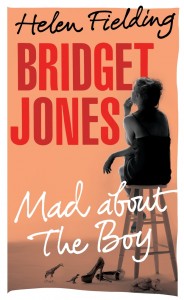Darcy dead? Will you read the new Bridget Jones novel?
Darcy dead? Will you read the new Bridget Jones novel?
Darcy dead? Will you read the new Bridget Jones novel?
-
Hannah
-
Hannah
 If publisher Random House was looking to ramp up publicity for Helen Fielding’s new Bridget Jones novel from sizeable interest to national outrage, it certainly met its objective. For the past few days, romance readers have been in uproar at the somewhat casual delivery, in the Sunday Times magazine, of truly devastating news about the novel.
If publisher Random House was looking to ramp up publicity for Helen Fielding’s new Bridget Jones novel from sizeable interest to national outrage, it certainly met its objective. For the past few days, romance readers have been in uproar at the somewhat casual delivery, in the Sunday Times magazine, of truly devastating news about the novel.
Anyone who’s read a Bridget Jones novel or watched the film would be forgiven for being really quite shocked. So may you be if you read the book’s blurb and thought it signalled clearly that this was light, witty, edgy romance like its predecessors:
Bridget Jones—one of the most beloved characters in modern literature (v.g.)—is back! In Helen Fielding’s wildly funny, hotly anticipated new novel, Bridget faces a few rather pressing questions:
What do you do when your girlfriend’s sixtieth birthday party is the same day as your boyfriend’s thirtieth? Is it better to die of Botox or die of loneliness because you’re so wrinkly? Is it wrong to lie about your age when online dating? Is it morally wrong to have a blow-dry when one of your children has head lice? Is it normal to be too vain to put on your reading glasses when checking your toy boy for head lice? Does the Dalai Lama actually tweet or is it his assistant? Is it normal to get fewer followers the more you tweet? Is technology now the fifth element? Or is that wood? If you put lip plumper on your hands do you get plump hands? Is sleeping with someone after two dates and six weeks of texting the same as getting married after two meetings and six months of letter writing in Jane Austen’s day?
Pondering these and other modern dilemmas, Bridget Jones stumbles through the challenges of loss, single motherhood, tweeting, texting, technology, and rediscovering her sexuality in—Warning! Bad, outdated phrase approaching!—middle age.
In a triumphant return after fourteen years of silence, Bridget Jones: Mad About the Boy is timely, tender, touching, page-turning, witty, wise, outrageous, and bloody hilarious.
Sounds like a jolly read, doesn’t it? Doesn’t sound like a book which is based on the foundation that Bridget’s happy-ever-after, so carefully built up to in books two and three, has apparently been decimated with the death of Mark Darcy.
My first thought, when I heard the news, was: ‘You can’t kill Mark Darcy!’ He’s a seminal character, both literary and romantically. The first man to utter those ‘just the way you are’ words that made millions of women melt. But more than that: he’s inextricably linked to Fitzwilliam Darcy of Pride and Prejudice. Kill Mark Darcy, and you effectively kill Fitzwilliam too. Sacrilegious!
What do you think? Is there room, in the ultimate ‘chicklit’, for such a culling of a hero? Can the book be ‘witty, wise, outrageous, and bloody hilarious’ when Mark Darcy is dead?
Social media has been bursting with dismayed women. Many are angry. Some are saying they won’t read the book at all now. I wonder, though. In order to really have an opinion, and see whether Helen Fielding has destroyed the love for Bridget Jones or, in fact, cemented it, you have to read the book. Perhaps, in fact, this is very clever and deliberate marketing. Perhaps the death of Darcy will see this book reach the top of the bestsellers’ lists. If so, I hope it’s for the right reason: because the book is great; not because people are buying it and reading it only to criticise it.
Will I read it? I’m not sure. I love a happy ending. I loved the Bridget and Mark happy ending in the last book. It’s hard to imagine getting the same ‘ahhh’ feeling again. But perhaps.